It’s the end of March and a drought has been declared in Provence. Indeed, the region is facing its driest New Year since 1959. If ever there was a climate-crisis klaxon, it’s this. And yet there’s a buoyant optimism afoot as I walk the land of Château Galoupet with a merry band of winemakers, viticulturalists and, perhaps most interestingly, conservationists.
Château Galoupet is a l’ieu d’it, marked on the map since the 1700s. In the distance and through Provençal umbrella pines, you can spy the Isle of Porquerolles and the Mediterranean Sea between, with a characteristically briny breeze skimming over the estate’s peaks, valleys and salt marshes before it meets 77ha of protected pine forest. It’s one of 18 estates in Provence that carries Cru Classé status. And yet, its new custodians say that the vineyard and surrounds were somewhat dilapidated when they first took it on.

‘It was a sleeping beauty; stunning, but lacking love,’ says Jessica Julmy, Galoupet’s managing director since LVMH bought the place in 2019. Julmy previously held a position as commercial director for historic Champagne house Krug, but now describes herself as ‘re-founder’ of an estate that’s immersed in nature. The former owner, says Julmy, focused on weddings and events as opposed to the vineyards, and many plots of the 69ha of vineyards were missing plantings entirely.
Now, there’s a 20-year plan in place to transform practices surrounding the land, and two years in on its journey in replanting and organic conversion, Galoupet has just released two expressions: Galoupet Nomade 2021, a Côtes de Provence rosé wine made in partnership with local Provençal growers – and delivered in a postbox-friendly, rectangular-shaped plastic wine bottle, made from recycled materials salvaged from the ocean – and its 2021 Cru Classé rosé. By the 2023 vintage, all wine grown on the estate should be certified organic.
Galoupet is a ground for environmental leadership, learning, and a leap into a more holistic approach to making a rosé
But for LVMH, which already owns a majority stake of the region’s famous Château d’Escalans and its calling card Whispering Angel rosé, Galoupet represents more than a winemaking opportunity. It’s a ground for environmental leadership, learning, and a leap into a more holistic approach to making a rosé. And while it’s about responsible viticulture from ground to glass, ‘being organic is the tip of the iceberg,’ says Julmy. She even declares that for a company like LVMH, there’s a certain sense of a responsibility when it comes to sustainability – the need to take the risk on this once-unloved estate and to invest in the region as a whole.

Plans for Galoupet in its transformation include the creation of a biodiversity trail, a ‘co-construction’ with local experts that will eventually open to the public and that will take in the sights and sounds of the natural habitat. This includes the addition of 200 beehives – in partnership with the l’Observatoire Francaise d’Apidologie (OFA), an organisation dedicated to the scientific study and safeguarding of honeybees – which is being referred to as a queen bee fertilisation station.
‘There’s nothing better than bees for biodiversity,’ says Thierry Dufresne, the OFA’s founder. Dufresne left a position as commercial manager at luxury brand Chanel to set up his bastion for beekeeping in 2014. The institution has already partnered with LVMH beauty brand Guerlain and its ambassador Angelina Jolie to help get its message on the fuzzy insects out there.

The Galoupet team is also working with the Conservatoire des Espaces Naturels (CEN) to evaluate the natural flora and fauna and help regenerate plant and insect life local to the region, from butterflies to rosemary plants and Provence’s signature lavender. And in partnership with the Ligue de la Protection des Oiseaux (LPO), they’ll be encouraging the growth of the birdlife population in the surrounding woodlands – including the introduction of treehouses for the dwindling bat population.
While these pursuits are undeniably noble, there are selfish reasons for Galoupet’s winemakers to explore a plethora of sustainable practices. The team seems obsessive with the many synergies the estate can offer, how these might improve vineyard soil quality, and how, in time, this could even have the potential to impact the flavour of the wine. ‘Everything is linked to everything,’ claims estate director Mathieu Meyer.

But working with the natural characteristics of the property also has its challenges – in particular, when it comes to the use of Tibouren. ‘We call it the teenager wine,’ says a grinning Meyer of the finickity grape variety. ‘It can be very bad at times, and then better.’ According to him, Tibouren relies on an accuracy of picking, with a 24-hour window before the grapes turn from great to not good. Even on the bunch, maturity can vary. And it’s also an oxidative variety, making it tricky to work with once in the winery.
However, in the 2021 Cru Classé, it delivers a thwack of dry apricot and ripe peach, with Julmy even going as far as describing it as Galoupet’s signature. ‘When you have a variety intrinsic to Provence, it would be sacrilege not to use it. And it’s really quite beautiful in the blend,’ she adds.

As we stand in one particular plot of Tibouren, in among the rows of cover crop – another experiment they hope will improve soil quality, increase water absorption and even reduce carbon emissions from the earth – a light, rain shower serendipitously breaks the long winter drought, and Meyer can’t help but continue to drive through the multi-faceted eco message that envelops the Château Galoupet ethos: ‘Each drop of water is a drop of life.’
Château Galoupet Cru Classé 2021 (£46) and Galoupet Nomade (£20) will be released at the beginning of May on clos19.com.








